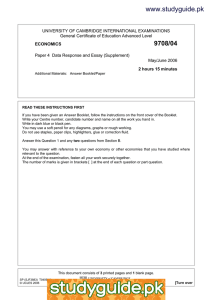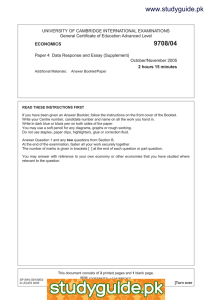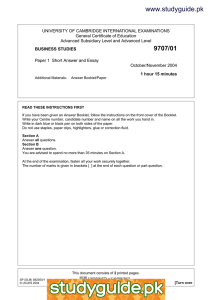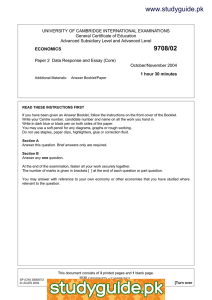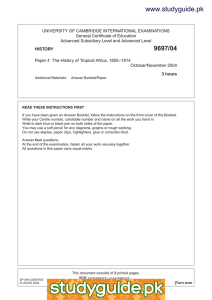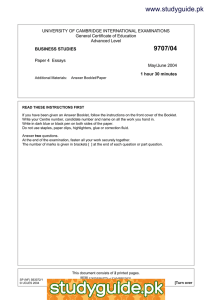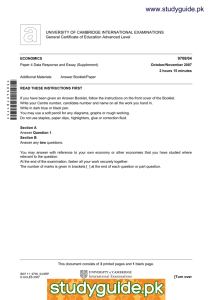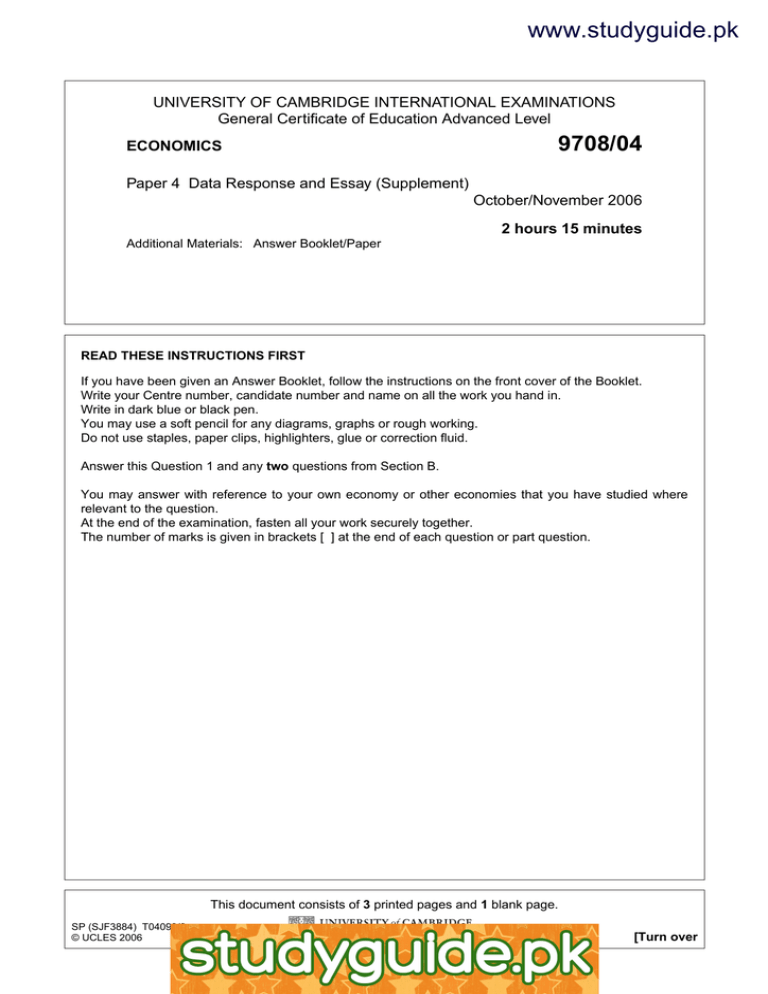
www.studyguide.pk
UNIVERSITY OF CAMBRIDGE INTERNATIONAL EXAMINATIONS
General Certificate of Education Advanced Level
9708/04
ECONOMICS
Paper 4 Data Response and Essay (Supplement)
October/November 2006
2 hours 15 minutes
Additional Materials: Answer Booklet/Paper
READ THESE INSTRUCTIONS FIRST
If you have been given an Answer Booklet, follow the instructions on the front cover of the Booklet.
Write your Centre number, candidate number and name on all the work you hand in.
Write in dark blue or black pen.
You may use a soft pencil for any diagrams, graphs or rough working.
Do not use staples, paper clips, highlighters, glue or correction fluid.
Answer this Question 1 and any two questions from Section B.
You may answer with reference to your own economy or other economies that you have studied where
relevant to the question.
At the end of the examination, fasten all your work securely together.
The number of marks is given in brackets [ ] at the end of each question or part question.
This document consists of 3 printed pages and 1 blank page.
SP (SJF3884) T04099/2
© UCLES 2006
[Turn over
www.xtremepapers.net
www.studyguide.pk
2
Section A
Answer this question.
1
Volkswagen seeks pay freeze in Germany.
In 2004 Volkswagen (VW) dismissed a union demand for a 4% annual pay increase
and instead announced plans to reduce paid work breaks and increase flexible
working time. It said it had to reduce its spending on labour by 30% by 2011. For the
next two years, in order to preserve its 176 500 jobs in Germany, it had to avoid pay
rises, especially because of the fierce competition in the market for cars.
The expected profits of VW were cut in 2004 because of high production costs,
weak demand and high oil prices. The company wanted to expand flexible working
time arrangements, which would allow it to save money by allowing workers to
‘bank’ overtime hours when production is high and then stay at home when
production is low but get paid from the ‘banked’ hours. They also wanted to reduce
the paid breaks and introduce a different pay system. Overtime rates would not be
paid until after 40 hours a week instead of the current 35 hours, and there would be
a ‘demographic’ work programme in which younger workers could work more hours
early in their career but then retire earlier.
The company also wanted to introduce a bonus system based on the company’s
financial performance which would replace the annual Christmas bonus payment.
The trade union called the proposals ‘extreme, unrealistic and poorly thought out.’
VW said it was changing its strategy so that it could compete more on price in order
to improve sales volumes. This would make it easier to cover its high fixed costs.
A spokesman said ‘if prices go down, costs have to as well. The proposals would
not reduce current employees’ take-home pay. It’s more about intelligent
reorganisation of the labour costs. VW’s costs are up to 80% less at factories in
Argentina and the Czech Republic than in Germany. The costs are too high in our
German factories’.
(a) Identify three factors that VW says are responsible for the reduction in expected profits.
[3]
(b) (i)
[2]
(ii)
Explain the difference between a fixed cost and a variable cost.
Consider which cost category is suitable for the wages paid by VW to its employees. [4]
(c) VW stated that they wished to ‘compete more on price’. Is that a suitable response to the
factors identified in (a)?
[5]
(d) Discuss whether it is reasonable to conclude that costs are too high in VW’s German
factories on the basis of the comparison given with Argentina and the Czech Republic.
[6]
© UCLES 2006
9708/04/O/N/06
www.xtremepapers.net
www.studyguide.pk
3
Section B
Answer two questions from this section.
2
3
(a) Explain what is meant by the term ‘economic efficiency’.
[10]
(b) Does the price mechanism allocate scarce resources efficiently?
[15]
My higher income will make me happier in the short run. In the long run I will become accustomed
to it and my happiness will return to the previous level. There is no point, therefore, in earning
higher income.
(a) Explain the Law of Diminishing Marginal Utility and discuss whether it supports the idea that
higher incomes increase happiness.
[12]
(b) Discuss how governments might achieve a more equal distribution of income.
4
[13]
In 2004 the Chinese government approved a deal with BAT (formerly British American Tobacco) to
enable them to become the first foreign manufacturer of cigarettes in China for at least 50 years.
BAT said that it would invest $1.5 million in China and that it would take about two years before the
factories were running efficiently. It is estimated that China has 300 million smokers and is the
world’s most important cigarette market.
(a) Cigarette manufacture takes place in an imperfect market. Distinguish between the imperfect
markets of monopolistic competition and oligopoly.
[13]
(b) Discuss how BAT’s investment might be likely to affect its profits in the short and long run.
[12]
5
(a) Explain what indicators would suggest that a country is developed rather than developing.
[12]
(b) It is sometimes stated that the policies of farm subsidies and international protectionism
pursued by developed countries have caused damage to the economies of developing
countries.
Discuss whether the policies of governments in developed countries necessarily harm
developing countries.
[13]
6
(a) Explain what determines the demand for money.
[10]
(b) In some countries it is said that the use of credit cards by many people has resulted in huge
debts as people spend far more than they earn. Discuss what might be the consequences of
a large increase in consumer spending.
[15]
7
Government economic policy should be aimed at the needs of citizens – employment, health,
education and a good environment. It should not concentrate on the balance of payments or gross
domestic product.
Discuss whether there is any truth in this statement.
© UCLES 2006
9708/04/O/N/06
www.xtremepapers.net
[25]
www.studyguide.pk
4
BLANK PAGE
Copyright Acknowledgements:
Question 1
Question 4
© International Herald Tribune, 24/08/04.
Reprinted by permission of The Far Eastern Economic Review © 2004 Dow Jones & Company, Inc. All rights Reserved Worldwide.
Permission to reproduce items where third-party owned material protected by copyright is included has been sought and cleared where possible. Every
reasonable effort has been made by the publisher (UCLES) to trace copyright holders, but if any items requiring clearance have unwittingly been included, the
publisher will be pleased to make amends at the earliest possible opportunity.
University of Cambridge International Examinations is part of the University of Cambridge Local Examinations Syndicate (UCLES), which is itself a department of
the University of Cambridge.
9708/04/O/N/06
www.xtremepapers.net


